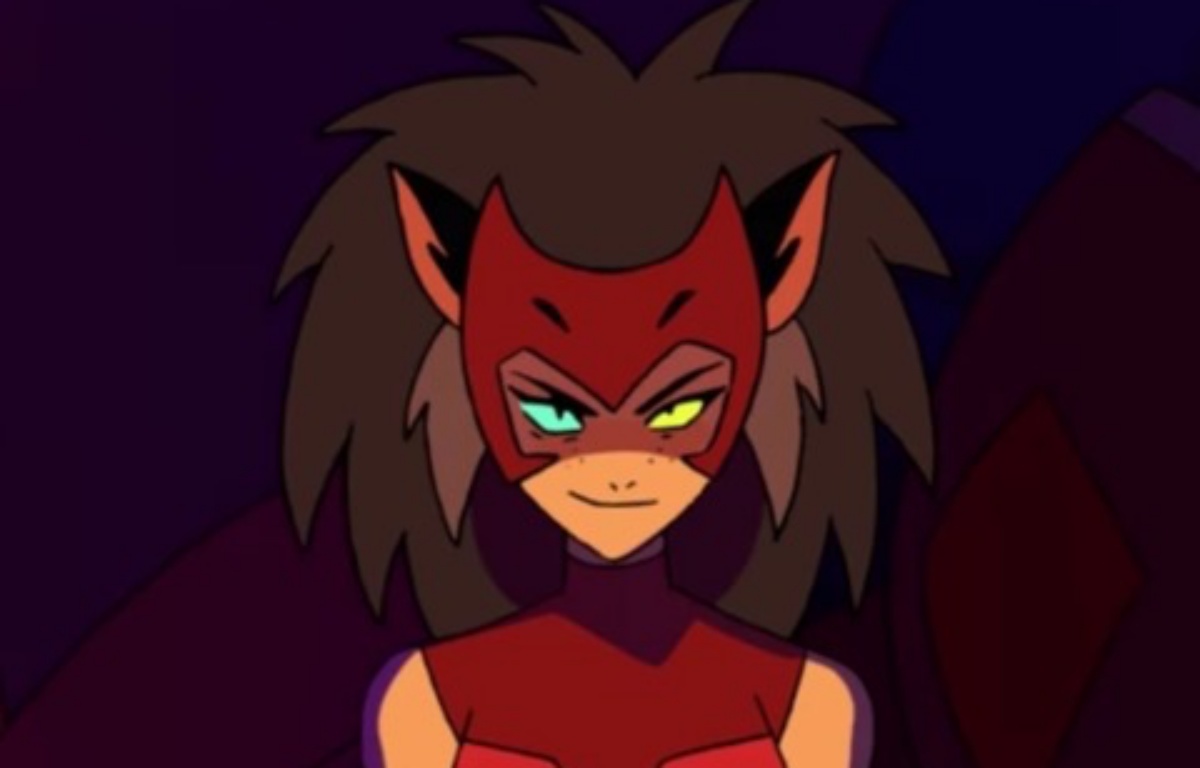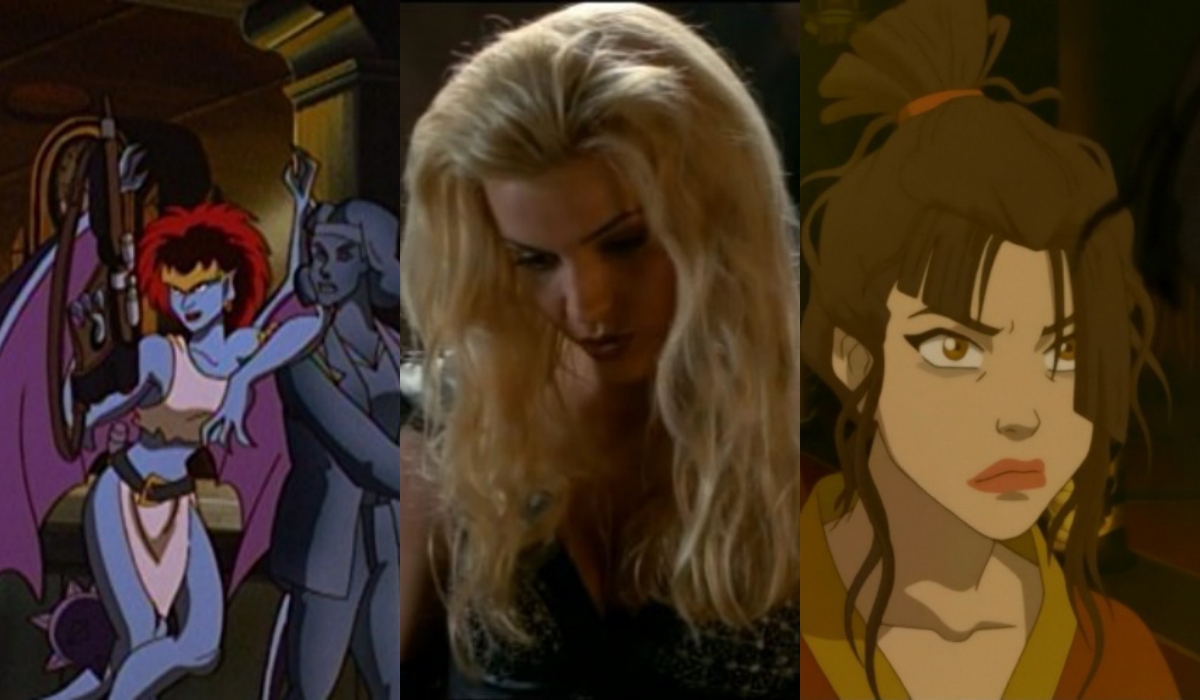Do Morally Complex Characters Need Redemption?
Catra x Therapy 2020.


Over the weekend, because I was dealing with severe back pain and muscle spasms, I decided it was time to be horizontal on my futon and finally watch all of She-Ra and the Princesses of Power because I’d heard things and I wanted to understand the gay youths. I know too much now. Because I’m weak, I fell in love with Catra (who I have affectionately dubbed Catzula) and was forced to watch my sweet baby cat-angel do what so many of my morally complex favs have done: go beyond the pale.
**Spoilers for Season 3 of She-Ra and the Princesses of Power.**
In the final episodes of She-Ra‘s third season, Catra lies, threatens, and manipulates the people around her in order to open a portal that will basically undo reality—all because it’s the opposite of what her ex-girlfriend rival, Adora, wants. In the battle to undo what Catra has done, the show’s main positive maternal figure, and Glimmer’s actual mother, Queen Angella sacrifices herself in order to save reality. As the evil Horde retreats, Adora gives Catra a death glare showing that whatever bond the two had is, for now, broken.
Some background for the uninitiated: The show takes place on the planet of Etheria, which is currently under invasion from the Horde and losing badly. Standing in the Horde’s way is The Rebellion, led by Queen Angella (R.I.P) and the forces of Brightmoon. The Horde is run by Hordak (cinnamon roll that kills), and the sorceress Shadow Weaver serves as his second-in-command. Shadow Weaver raised two wards, Adora and Catra.
Adora is like Avatar: The Last Airbender’s Azula, but good; she’s competent, the favorite, and had innocent but problematic blinders on, leaving her ignorant of the world and abuse around her. Catra is like Zuko, but with Azula personality. Catra was abused and mistreated in favor of Adora, and that deep insecurity grows throughout the series. When Adora leaves the Horde, once she realizes the terrible things they’re doing, Catra feels betrayed and works to prove herself in Adora’s absence.
The tragic beauty of Catra’s character is that, to a degree, she’s absolutely right to be as pissed off as she is. One of my favorite scenes is in the two-parter beginning, wherin Adora tells Catra that the Horde is evil, and Catra’s reaction is pretty much “Duh.” She knows the Horde is evil because she’s been physically and emotionally abused by the second-in-command her whole life. Catra, much like Zuko, still yearns for the approval of her parental figure to the point where it keeps her from personal growth.
Shadow Weaver would punish Catra in front of Adora and would dress her down constantly, and while Adora would defend her friend, it wasn’t enough to have make her defect. Part of the underlined damage for Catra is that her girlfriend best friend was complicit in her abuse and only rose up to defend strangers. For Catra, this is just another reminder of how she wasn’t good enough.
As Margaret Evans explains in her excellent piece about Catra and Adora’s toxic relationship, Catra has the chance to stay in the Crimson Wastes, but finding out that Shadow Weaver left to go help Adora, causing Catra to be tortured, breaks her once more. She trusted Shadow Weaver, tried to save her life, and was betrayed in favor the same person, as always.
Rather than live out the life of a desert rogue, she focuses on revenge. It’s hard to watch because we know how deeply Catra has been hurt. In the fantasy world that is “perfect,” Catra and Adora are still together, and Shadow Weaver is proud of them both. That is Catra’s idea of perfection, and the fact that Adora can’t keep that illusion alive breaks them apart.
Catra is responsible for her actions, but good writing allows us to understand why. So, the question is … can she come back from this? Or more importantly, does she need to come back from this?

Redemption means the action of saving or being saved from sin, error, or evil. For many evil characters, especially ones with heartbreaking origins, there is a desire to see them be “saved” by some means, whether it be through love, friendship, or therapy. The problem is that not every action can, or should, be forgiven, and sometimes, in trying to allow a character their redemption, we conveniently revise history to tone down the actual things they have done.
One example of this that I think about a lot is Regina Mills in Once Upon a Time. I am an Evil Regal to the core, but one of the frustrating things about the show is that, when it decided that it was going to actually stick the landing on the Regina Mills Is Good Now storyline, they would ignore that Regina was a rapist and a mass murderer. Whenever someone from her past wanted revenge, the victim was expected to act nobly, and everyone rushed to defend Regina, saying she had “changed.” As a fan of the character, I wanted my sweet angel to be protected, but from a story perspective, it was exhausting to constantly see the very things that made Regina a morally complex character get hand-waved.
Callisto from Xena was another example. She was a victim of Xena’s army back when the protagonist was a warlord (which was then retconned because of some time-lord ish we won’t get into rn). Her family was murdered, and she became a violent, angry person who wanted to make the world feel as much pain as she did.
One of my favorite quotes from her is in the episode “Sacrifice,” wherein she tells Xena that she wants to die because there is nothing left for her in this world: “I just want my creator to know why I have to enter Oblivion. There’s nothing left for me. All the love and joy I had died that night in Cirra when you killed my family. There was … there was hatred … and resentment, and that was … that was absolutely delicious. Wonderful. But now, there’s nothing left. Nothing. Do you understand me?”
In Callisto’s case, redemption comes with Xena having to purge her soul of all the hatred she had when she was alive, because that was the only thing that could save her. It’s very deus ex machina and never gives Callisto a chance to atone for anything, she’s just magically made good because at this point there is no way for her to be good without literal divine intervention. It’s not a bad ending, but it’s unsatisfactory for a character with so much meat on her.
Demona from Gargyoles actually reminds me the most of Catra. Demona is her own worst enemy because, despite the fantastical racism she has faced, it led to her making decisions that left people she loved dead. While humans had shown their ass to her plenty, she had plenty of choices to make changes but didn’t. Writer and producer Greg Weisman has also hinted that eventually she will indeed have an epiphany, learn that she was responsible for her own misery and suffering, and undergo some sort of change of heart—or go “crazy.” I honestly feel like Demona’s beauty as a character is that she has lived long enough to have been given plenty of chances for growth and just doesn’t want to because she’s manipulated her own mind enough to believe that she’s right.
Also, humans do suck, so she ain’t totally wrong.
Azula is what I’m most afraid of for Catra. I have talked before about how I don’t really care for Azula’s downfall when I rewatch Avatar, because I just think it happens so quickly, but because Catra and Azula share the same core need to be perfect for a parental figure, I can see the similarities. (Also, they could share wardrobe.) The reason I don’t want the Azula route for Catra is that it takes a lot of responsibility off of Shadow Weaver.
Shadow Weaver is an abusive monster who is currently sitting pretty with Team Good because of her magical abilities. If Shadow Weaver isn’t held accountable, I’m calling shenanigans, because her behavior molded Catra into the person she is. You can’t abuse a child, but because of usefulness, get a pass. It doesn’t work that way, and if they begin a storyline where Shadow Weaver can return to the good, then Catra can come, as well. Otherwise, it will just ring false.
I love Catra, and I think she’s a fantastically written antagonist. I want her to be okay because she’s my baby, but redemption has to have a message behind it. It has to get at the core of the villainy itself. Otherwise, it’s just fanservice. Unless they tackle the abuse head on and have her take accountability, it won’t allow the character to be as awesome as I think she could be—and if she can’t be a solid anti-hero, then let her be a fantastic villain.
What are some of your least favorite redemption storylines in television/film?
(image: Netflix)
Want more stories like this? Become a subscriber and support the site!
—The Mary Sue has a strict comment policy that forbids, but is not limited to, personal insults toward anyone, hate speech, and trolling.—
Have a tip we should know? [email protected]
